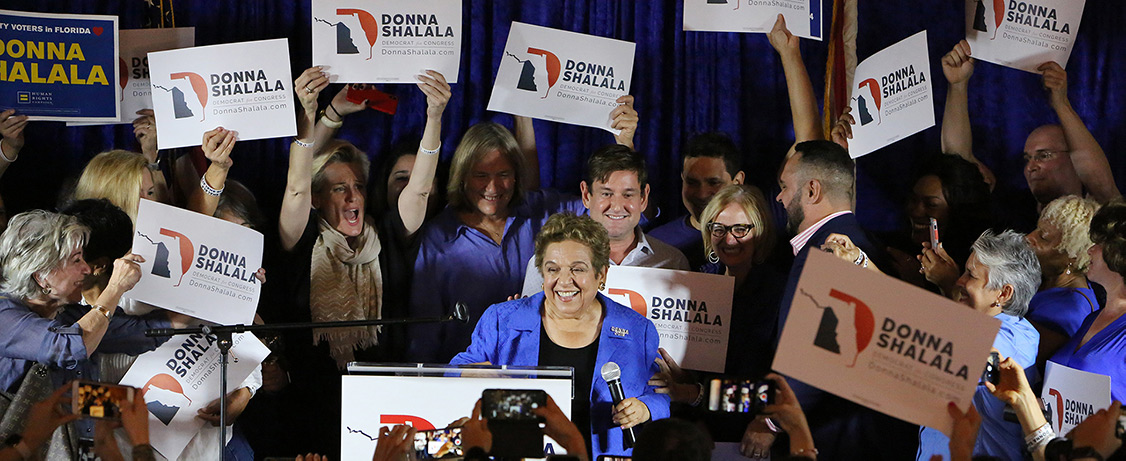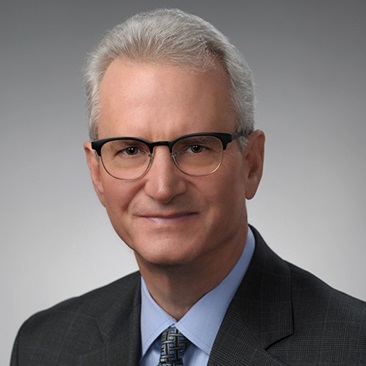
Alumni Spotlight: Freshman Rep From Florida
June 1, 2019
Donna Shalala took a look at Washington and decided that the Capitol needed someone like her. Meet the new Congresswoman from Florida.
Everyone talks about the diversity of the House of Representatives’ 2019 freshman class—particularly the influx of women and people of color. Most observers will tell you that those demographic changes are accompanied by highly progressive, left-leaning political inclinations.
But Donna Shalala will tell you otherwise.
Many of the incoming Democrats, she says, were elected in districts that had been held by Republicans for long periods, and that had voted or leaned toward Donald Trump in the last election. The key to their electability was appealing to the political center.
“What’s important is that most of the people who flipped seats are in fact centrists,” she says. “They’re not either to the left or to the right—despite the narrative out there that the new members are lefties and socialists.”
In January, Donna Shalala joined them, sworn into Congress as the representative of Florida’s 27th district, which includes about half of Miami and much of its eastern suburbs. Republicans had represented the district for decades. Flipping that seat, she reasoned, could be pivotal, not just for her party, but for her district and their core issues, such as health care, immigration and climate change.
“I’m a pragmatist. I’m a person that understands the issues of implementation and holding government accountable.”
—Donna Shalala 70 M.S.Sc./ '70 Ph.D./'87 LLD
On the face of it, 2018 was an unlikely time for Shalala to embark on an entirely new chapter in her career. She was 77, and had been a leader in higher education and government for nearly 50 years. She’d recently completed a long tenure as president of the University of Miami. During Hillary Clinton’s presidential campaign, Shalala took the helm of the Clinton Foundation in New York, but stepped down in 2017—settling again in Florida and teaching political science and health policy at the University of Miami, with every reason, it seemed, to ease toward retirement. But she saw an opportunity to make a difference in Washington.
By the time she decided to enter the fray—in her first-ever run for elected office—a field of Democratic candidates had already been campaigning in the 27th district for a year. “I liked them all,” she says. “Some of them were long-time personal friends. But they weren’t as well known, they weren’t strong enough, and they were a little far to the left for the district—not to win the primary but to win the general."
Yes, she’ll tell you her path to Congress began with a feeling of outrage. “I woke up last March and turned on the television,” she recalls, “and just got pissed off at what was going on in Washington.”
But she ran for office not to offer yet another loud voice from the other side of the aisle. She planned to focus on the issues that mattered in her district.
“I said to myself, my service isn’t over.”
As a newcomer to Congress who already has deep experience in Washington, including eight years as a cabinet secretary in the Clinton administration, Shalala brought an unusual perspective to the new job, to say the least.
“As I’ve said to everybody, I’m a freshman but I’m not a rookie,” she says. “It’s not simply being knowledgeable about the issues. I’m a pragmatist. I’m a person that understands the issues of implementation and holding government accountable. I’ve been on the executive side, but I’ve also been a policymaker for a very long time.”
Shalala’s keen interest in public policy extends back to her days at the Maxwell School, where she earned both a master’s and Ph.D. in social science and wrote her doctoral dissertation on the politics of municipal finance. Her knowledge of city budgeting was her entrée into government; in 1975, while she was a professor at Columbia University, she was appointed to the commission that helped save New York City from bankruptcy. She went on to spend a dozen years in public service in Washington, as assistant secretary for policy development and research in the Department of Housing and Urban Development in the Carter administration, and secretary of Health and Human Services for eight years under President Clinton. Since 2001, she’d been in academia. Now, as a congresswoman, she relishes the chance to focus on policy again.
“It’s much less stressful than running a university, let me assure you,” she says. “No one’s waking me up in the middle of the night with some horrible tragedy. I’m not responsible for hiring and firing large numbers of people. I’m not accountable for compliance.
Shalala and her new colleagues arrive in Congress, of course, at a particularly acrimonious moment in American politics. While there have always been political disagreements and divisions on Capitol Hill, as well as among Americans generally, Shalala does see this era as qualitatively different than the past in some respects. “The extremes are more partisan,” she says. “I think that’s in part due to social media and instant news.” She stresses, however, that her constituents’ concerns are far more pragmatic than ideological.
“They want to know if I can do something about the cost of drugs, or whether I can bring some of their tax money back to improve the transit system, or whether I can get something done to protect the DACA kids. And [they ask] about climate change. In my district there’s no debate on climate change; it’s life or death for us. Protecting the Everglades is critical for my district. They’re asking about very specific things that affect their lives. What they’re talking about are pocketbook issues and the future of the country.”
All of which begs the question about whether Shalala and her fellow representatives actually can get something done in Washington, given the partisan gridlock on so many core issues. Collaboration between the parties, she said, is still possible—and crucial.
“I came from a world of bipartisanship, at the state level as well as at the national level,” she says. “Certainly I’ve had long-time relationships with Republicans both in the Senate and the House. We’re reaching across the aisle when there’s a willing hand reaching out to us, but that’s public policy. The best public policy is often done in a bipartisan manner.”
Shalala points out that her first bill, the Venezuela Arms Restriction Act, which prohibits arms sales from the United States to Venezuelan security forces, was bipartisan and passed the House by voice vote with no objections. She says she hopes to follow it with more legislation backed by wide support. Other areas in which Shalala sees opportunities for bipartisan progress are an infrastructure bill and initiatives to rein in prescription drug costs. As a longstanding authority on health policy, going back to her years leading the Department of Health and Human Services, she is convinced that Congress will be able to protect coverage of pre-existing conditions through the Affordable Care Act—another top concern among her constituents.
In education policy, too, Shalala believes there may be bipartisan support for addressing issues with student debt and with Pell grants. Her appointment to the House Education and Labor Committee, and the pending reauthorization of the Higher Education Act, give Shalala an opportunity to tap into her decades of experience as both a professor and a university president.
In considering education policy, she says, it’s important to remember that most students in higher education are attending school part-time and working. “The four-year undergraduate education is the exception rather than the rule,” she says, “We’ve got to understand people’s lives that are in higher education. We need more opportunities for minorities in particular, and women, at every level of higher education.”
Given her decades of experience in teaching and in academic administration, Shalala, a member of the Maxwell Advisory Board, is keenly aware of the role that universities play in helping to develop and inform public policy.
“If you look at the history of environmental policies, if you look at the history of the social safety net, they have been ideas out of higher education that have been implemented,” she says. “That’s social policy. In terms of science policy, higher education is really the scientific engine that drives the economy. Our investments in the National Institutes of Health, in the National Science Foundation, and in NOAA [National Oceanic and Atmospheric Administration] have made us the cutting-edge nation in the world in terms of policy.”
By Jeffrey Pepper Rodgers
This article appeared in the Spring 2019 print edition of Maxwell Perspective © Maxwell School of Syracuse University. To request a copy, email maxwellperspective@syr.edu.
Related News
School News

Dec 19, 2024
School News

Nov 27, 2024
Commentary

Oct 31, 2024
